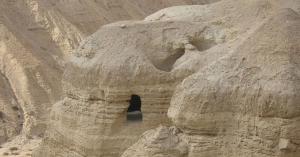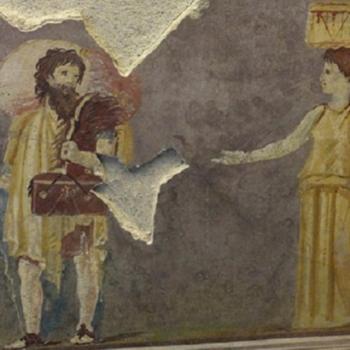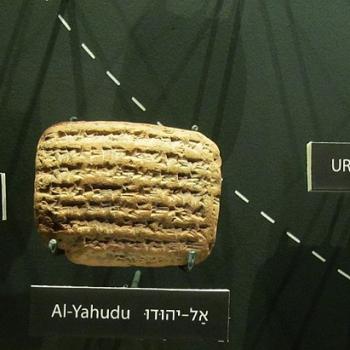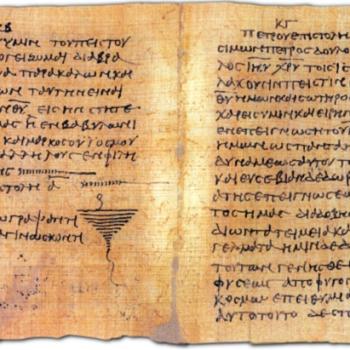The ancient Qumran community was so strict about the Sabbath that their rules did not even let them use the restroom on that day! They taught that on the Sabbath, a member was not to walk more than 1000 cubits outside his city. But their community’s latrine was 1500 cubits (3000 feet) outside the city, to prevent grossing God out (Deuteronomy 23:12-14). How did they solve this problem? Josephus says: they didn’t.

Chief among the beliefs at Qumran was their belief in communal living. Philo tells us, “There is but one purse for them all, and common expenses, common clothes, and common food in common meals.” Josephus says, “Contemptuous of wealth, they are amazing in their communal practice… Novices admitted to the sect must surrender their property to the order, so that among them all, neither humiliating poverty nor excessive wealth is ever seen.”
The Dead Sea Scrolls tell us that there was private ownership at Qumran, but all property had to be registered when someone joined, and all property had to be available for community use. If a person lied about their property, they could be excluded from the holy food for one year. (Compare with what happened to Ananias and Sapphira in Acts 5!) They were permitted to conduct trade with outsiders by special permission. They had to give two days’ wages per month into a common fund to help those in need among them.
The Qumran commune lived a rigidly simple lifestyle, wearing only white and wearing the same clothes and shoes until they wore out. In their meals, Philo says that they “are contented with the same dish day after day, loving sufficiency and rejecting great expense as harmful to mind and body.”
Qumran members had no need to carry luggage or supplies when they went on a trip, since there was always someone around to provide them hospitality. Josephus writes, “When adherents arrive from elsewhere, all local resources are put at their disposal…and men they have never seen before entertain them like old friends. And so when they travel, they carry no baggage at all, but only weapons to keep off bandits.” One will recall that Jesus sent his followers out this way, with nothing but a staff (Mark 6:7-11) – perhaps he had a similar network of sympathizers who would take them in.
The folks at Qumran were stricter than the Pharisees in their keeping of the Sabbath. According to the Dead Sea Scrolls, “On the day of the Sabbath, no one should say a useless or stupid word. He is not to lend anything to his fellow. He is not to take decisions with regard to riches or gain. He is not to speak about matters of work or of the task to be carried out on the following day…
“No one is to eat on the Sabbath day except what has been prepared…He is not to draw water with any vessel…No one should go after an animal to pasture it outside his city, except for 2000 cubits.” No one should move anything into or out of a house. “He is not to open a sealed vessel on the Sabbath…In his dwelling no one should lift a stone or dust. The wet-nurse should not lift the baby to go out or come in on the Sabbath…No one should help an animal give birth on the Sabbath day. And if it falls into a well or a pit, he should not take it out on the Sabbath…And any living man who falls into a place of water or into a reservoir, no one should take him out with a ladder or a rope or a utensil.” Yet Qumran was surprisingly lenient on punishing the violation of the Sabbath. The Law of Moses prescribes death, but Qumran decrees that the offender be put on probation for seven years.
Qumran was so determined to avoid immorality that many of them practiced celibacy. But their writings indicate that some of them were married, particularly those who lived away from Qumran scattered around Israel. The issue was ritual purity. The Law of Moses says that even married sex causes defilement until evening (Leviticus 15:18). Therefore, Qumran had a rule: “No one should sleep with a woman in the city of the temple,” which would make married life impractical at Qumran itself.
Because so few of them were married, Qumran kept their community going partly by taking in other people’s children, such as orphans. John the Baptist may have been raised at Qumran after the death of his aged parents.
Qumran was also strict in their teaching about oaths. We are told by Josephus, “Every word they speak is more binding than an oath. Swearing they reject as worse than perjury, for they say a person is already condemned if they cannot be believed without God being named.” And yet, when a person joined their group, they had to swear fearful oaths of loyalty to the community. Those who were kicked out of the community had to either eat grass and live off the land, or starve, because they had sworn not to eat the food of unbelievers. This may explain why John the Baptist lived on locusts and honey, and would not even eat bread or drink Passover wine (according to Josephus) – perhaps John had taken the same oath in the past.
Qumran had a long list of offenses for which you could be kicked out either temporarily or permanently. It took about two years of probation before you became a full member who could share the holy food and participate in decision-making. But anyone who deliberately disobeys the Torah can be kicked out permanently, or if by accident, they can be excluded for two years. There were penalties for indecent exposure (30 days, or six months for total nakedness). Falling asleep during a meeting was punished by 30 days’ penance. There were unspecified punishments for speaking foolishly, spitting or loud laughter in a meeting, interrupting a speech, insulting a companion, leaving a meeting more than three times, or bearing malice against a companion. Slandering the congregation or murmuring against its authority called for permanent expulsion.
Like many of the folks at Qumran, both Jesus and John the Baptist practiced celibacy. Jesus speaks critically of wealth, and advocates giving up one’s private possessions. (Luke 12:33: “Sell your possessions and give alms.” Luke 14:33: “Whoever does not renounce all that he has cannot be my disciple.”) Even the early church put this idea of communal living into practice. Like the folks at Qumran, Jesus forbids swearing. His sending out of the Twelve seems to presuppose that he’s got a network of hospitality to rely on (possibly followers of John).
But unlike the folks at Qumran, whose salvation was open only to a few, who excluded the handicapped, and who separated themselves from the unbelieving world, Jesus and John opened their movements to all, even tax collectors and hookers, and Jesus freely associated with sinners instead of withdrawing from them. Qumran yelled at the Pharisees, while Jesus was too far from Qumran’s beliefs for them to take him seriously. But Jesus was well-positioned to win people from Qumran who longed for a better way.














